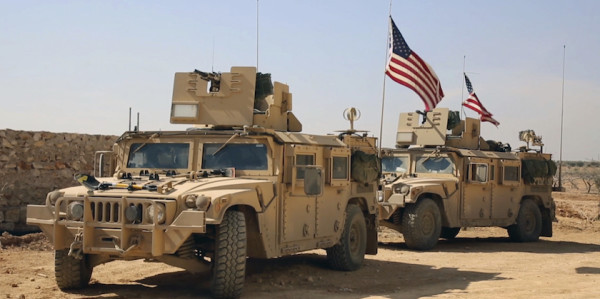

“The Americans lost nearly every war. They lost in Iraq, they had to withdraw at the end. Even in Somalia, let alone Vietnam in the past and Afghanistan,” Syrian dictator Bashar al-Assad said in a recent interview.
While speaking with Chinese media outlet Phoenix TV, Assad called American troops deployed to Syria as part of the war against ISIS “invaders” and trolled the United States’ recent war record, but he stopped short of asking the U.S. military to withdraw from his country.
Assad, whose Russian-equipped military is just one of the many armed factions embroiled in the six-year-old Syrian Civil War, spent the interview listing off previous American conflicts, and perceived U.S. setbacks, as evidence that the current Pentagon campaign in Syria is doomed to fail.
“What are they going to do?” Assad said.
“They didn’t succeed anywhere they sent troops,” he added, “they only a create a mess; they are very good in creating problems and destroying, but they are very bad in finding solutions.”
The U.S.-led military effort against the Islamic State in Iraq and Syria, Operation Inherent Resolve, began in 2014 with 3,000 troops. The recent deployments of approximately 100 Army Rangers and an undisclosed number of Marines, including members of an artillery battery, to northern Syria has raised speculation, including from Task & Purpose, that American troops will play a significant role in the looming battle to retake Raqqa, the Islamic State’s de facto capital in Syria.
President Barack Obama had ruled out sending conventional U.S. ground troops to Syria, though 500 American commandos were deployed there under his watch.
Until now, the U.S. military mission in Syria has been limited to training, advising, and equipping local forces, aerial bombardments, and the occasional clandestine raid carried out by Tier 1 special operations groups like SEAL Team 6 and Delta Force. Of course, with the arrival of more conventional troops on the ground, the likelihood of another open-ended American occupation in the Middle East — like Operation Iraqi Freedom — only increases, and that prospect seems to have the Syrian dictator worried about losing the progress he and his loyalists have made in a civil war that nearly toppled him.
In Assad’s interview with Phoenix TV, he didn’t rule out an alliance between American troops and Syrian regime forces, but suggested that such a partnership would only be possible if the United States committed more fully to helping his regime rid the country of the myriad groups fighting to topple him. That approach would entail working with the Russians, whose intervention in the war has greatly improved Assad’s chances of staying in power, but at the cost of thousands of innocent lives. In fact, according to an August 2016 report from a United Nations-sanctioned human rights group, Russian airstrikes have killed more Syrian civilians than ISIS.
“[U.S. military intervention] cannot be from the air,” Assad said. “It should be in cooperation with the troops on the ground. That’s why the Russians succeeded — since they supported the Syrian Army in pushing ISIS to shrink, not to expand as it used to be before that.”
Assad’s statements could certainly be interpreted as an attempt to persuade the Trump administration to throw its weight behind the regime by warning that U.S. military efforts in Syria will fail unless it joins the Russian-Syrian coalition, which is bolstered by Shiite Hezbollah militants and Iran. However, despite Trump’s earlier interest in cooperating with Russia in the war against ISIS, multiple administration officials have now told U.S. News and World Report that no such alliance will be formed. According to those officials, Defense Secretary James Mattis, who is helming the anti-ISIS strategy, is one of a number of officials who see little value in fighting on behalf of the Syrian regime.
“Our professional military and the people who are engaged in planning don’t actually think — other than preventing inadvertent fire, friendly fire, collateral damage — they’re very skeptical of this theory of the Russians actually being much use to our efforts,” an advisor to the Trump team told U.S. News on March 13.
Before the Russians ramped up involvement in the Syrian civil war, many foreign policy experts believed that the Assad regime would be swiftly toppled by anti-government rebels. In the early days of the war, which began in 2011 after the regime’s brutal crackdown of a peaceful protest movement, droves of Syrian government and military officials defected to the opposition, which scored a number of major battlefield victories in 2012 and 2013. But the rise of ISIS and the deployment of Russian troops and aircraft turned the tide of the conflict in Assad’s favor.
The arrival of American troops on the ground could either stymie or accelerate that momentum. Assad knows his survival hinges on ensuring the latter, which means convincing the Trump administration that it’s in America’s best interest to help wipe out not just ISIS, but all the rebel groups vying for his disposal. Since 2011, the Syrian government has labeled all rebels “terrorists,” including members of the U.S.-backed Free Syrian Army.
“Talking about ISIS doesn’t mean talking about the whole terrorism,” Assad said. “ISIS is one of the products, al Nusra is another product. You have so many groups in Syria. They are not ISIS, but they are al Qaeda, they have the same background of the Wahabi extremist ideology.”
